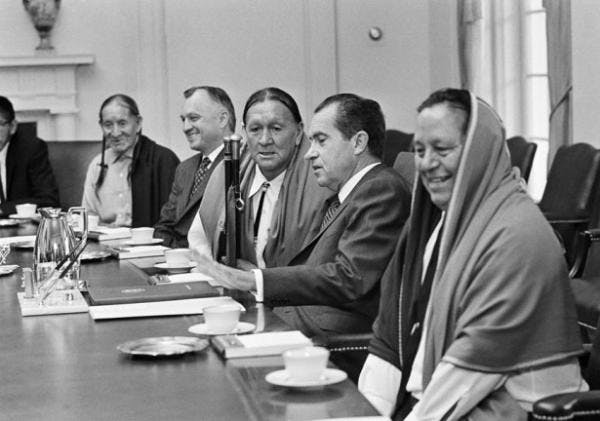
- Details
- By Neely Bardwell
The U.S. Senate on Monday unanimously passed a bipartisan resolution commemorating the 50th Anniversary of the Indian Self-Determination and Education Assistance Act, an act of Congress that fundamentally changed Federal Indian policy.
The resolution, led by Senator Lisa Murkowski (R-AK), Chairman of the Senate Committee on Indian Affairs (SCIA), and Senator Brian Schatz (D-HI), Vice Chairman of the SCIA, was co-sponsored by Senators Catherine Cortez Masto (D-NV), John Curtis (R-UT), Tammy Duckworth (D-IL), Martin Heinrich (D-NM), John Hoeven (R-ND), Amy Klobuchar (D-MN), Ben Ray Lujan (D-NM), Markwayne Mullin (R-OK), Alex Padilla (D-CA), Mike Rounds (R-SD), and Tina Smith (D-MN), and Dan Sullivan (R-AK).
The Indian Self-Determination and Education Assistance Act was signed into law in 1975 and promoted tribal self-determination through tribal involvement and oversight of programs and services administered to them on behalf of the U.S. government. Since then, Congress has amended the Act numerous times in order to further expand tribal self-determination and self-governance authorities across the federal government.
The ISDEAA recognized the inherent sovereignty of tribes. The Act also authorized tribes to administer federal programs, functions, and services like healthcare, education, public safety, and natural resources development, effectively allowing Tribes to be the decision makers for their own people.
Chairman Murkowski cites the ISDEAA as a huge reason tribes have raised the quality of life, culture, and community across the nation.
“Because of ISDEAA and the expansion of self-determination and self-governance across many agencies, Tribes have raised the quality of life of their people, boosted local economies, improved health care delivery, and designed and implemented services that are better tailored to their unique communities – including in job training, transportation, housing, social services, forestry, and more,” said Chairman Murkowski. “I’m proud to lead this bipartisan resolution, alongside Vice Chairman Schatz, as a way to honor the incredible progress tribes are able to make when the federal government upholds the trust responsibility while honoring Tribes’ right to self-determination.”
The ISDEAA came after President Richard Nixon addressed Congress and called for a new era of Tribal self-determination. It has been a little over five decades since this, and Schatz believes the progress made since then is now at risk.
“More than five decades ago, President Richard Nixon stood before Congress and called for a new era of Tribal self-determination—ushering in the most successful federal policy for Native people in our nation’s history,” said Schatz in a statement. “For decades, administrations from both parties have strengthened Tribal sovereignty and self-governance. But today that progress is at risk, as recent actions threaten to make it harder for Tribes to access federal funding and for the government to fully uphold its trust and treaty obligations. Instead of moving backward, we should commemorate this anniversary by continuing to build upon its legacy.”
More Stories Like This
Native News Weekly (August 25, 2024): D.C. BriefsNavajo Nation Mourns the Passing of Former Vice President Rex Lee Jim
Deb Haaland Earns Endorsement From Communications Workers of America Local 7076
University Soccer Standout Leads by Example
Two Native Americans Named to Democratic Congressional Campaign Committee's“Red to Blue” Program
Help us defend tribal sovereignty.
At Native News Online, our mission is rooted in telling the stories that strengthen sovereignty and uplift Indigenous voices — not just at year’s end, but every single day.
Because of your generosity last year, we were able to keep our reporters on the ground in tribal communities, at national gatherings and in the halls of Congress — covering the issues that matter most to Indian Country: sovereignty, culture, education, health and economic opportunity.
That support sustained us through a tough year in 2025. Now, as we look to the year ahead, we need your help right now to ensure warrior journalism remains strong — reporting that defends tribal sovereignty, amplifies Native truth, and holds power accountable.
 The stakes couldn't be higher. Your support keeps Native voices heard, Native stories told and Native sovereignty defended.
The stakes couldn't be higher. Your support keeps Native voices heard, Native stories told and Native sovereignty defended.
Stand with Warrior Journalism today.
Levi Rickert (Potawatomi), Editor & Publisher


